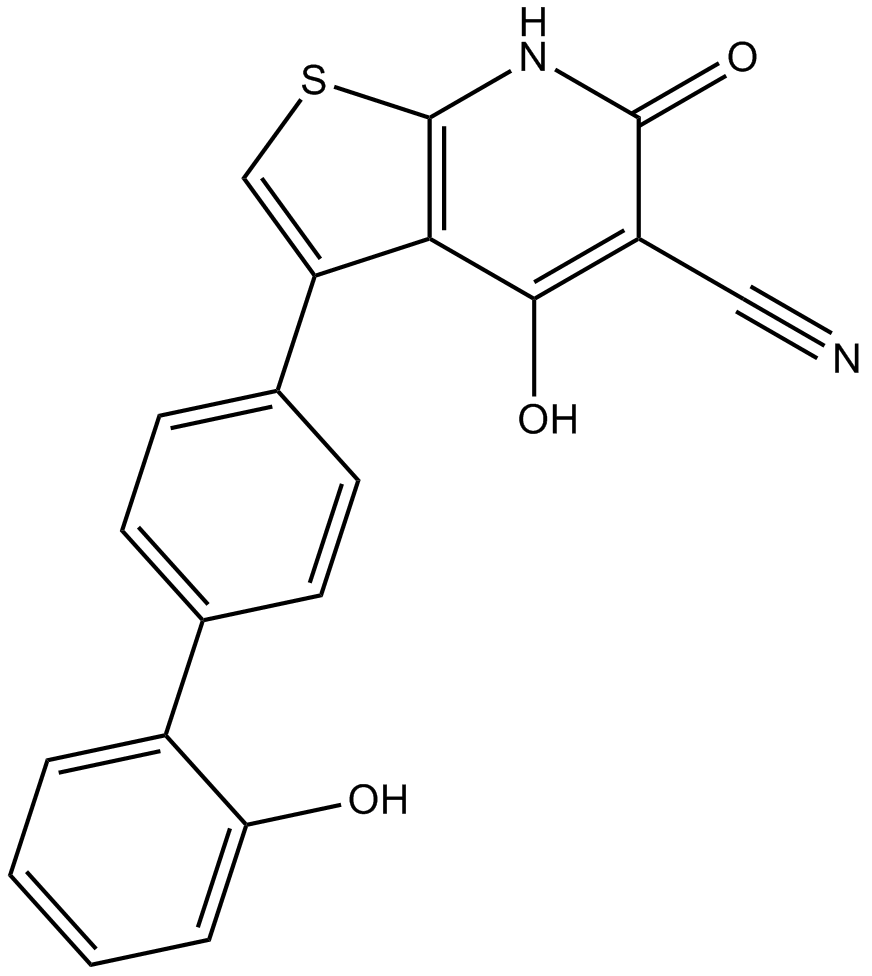A-769662 (Synonyms: A-769662;A769662) |
| Catalog No.GC11234 |
A direct activator of AMPK
Products are for research use only. Not for human use. We do not sell to patients.

Cas No.: 844499-71-4
Sample solution is provided at 25 µL, 10mM.
A-769662 is a potent activator of AMPK with EC50 value of 0.8 μM in vitro[1].
AMPK(AMP-activated protein kinase) is a serine/threonine protein kinase which is formed by three proteins: α,β and γ subunits. They play important roles in both the activity and stabilities of AMPK. AMPK functions as sensors of cellular energy by detecting and reacting to the change of AMP: ATP ratio. AMPK plays an important role in regulating intracellular energy metabolism. AMPK inhibits ATP-consuming pathways containing cholesterol synthesis, fatty acid synthesisand gluconeogenesis. AMPK stimulates fatty acid oxidation and glycolysis which are ATP-generating processes. AMPK inhibits gluconeogenesis by suppressing the expression of glucose-6-phosphatase and PEPCK wich are two key gluconeogenic enzymes.[1]
A-769662 belongs to the thienopyridone family. It activates the activity of purified AMPK from diffrent tissues with a dose-dependent manner. A-769662 activated the activity of AMPK extracted from human embryonic kidney cells (HEKs), rat muscle, or rat heart with EC50 values of 1.1 mM, 1.9 mM, or 2.2mM, respectively. A-769662 inhibited the synthesis of fatty acid with IC50 value of 3.2mM in primary rat hepatocytes.[1] A769662 also has inhibition effect on the 26S proteasome with an AMPK-independent mechanism. A769662 does not inhibit the proteolytic activities of the 20S core subunit which is a novel mechanism. A769662 can cause the arrest of cell cycle by inhibiting the 26S proteasome[2]. A-769662 activates AMPK in an allosterically manner. It also inhibits Thr-172 dephosphorylation of AMPK.[3]
In mice treated with dose of 30mg/kg, A-769662 decreased the expression of FAS, G6Pase, and PEPCK in liver of. It also lowered plasma glucose by 40% and reduced body weight gain.[1]
References:
[1]. Cool B, Zinker B, Chiou W, Kifle L, Cao N, Perham M, Dickinson R, Adler A, Gagne G, Iyengar R et al: Identification and characterization of a small molecule AMPK activator that treats key components of type 2 diabetes and the metabolic syndrome. Cell Metab 2006, 3(6):403-416.
[2]. Moreno D, Knecht E, Viollet B, Sanz P: A769662, a novel activator of AMP-activated protein kinase, inhibits non-proteolytic components of the 26S proteasome by an AMPK-independent mechanism. FEBS Lett 2008, 582(17):2650-2654.
[3]. Sanders MJ, Ali ZS, Hegarty BD, Heath R, Snowden MA, Carling D: Defining the mechanism of activation of AMP-activated protein kinase by the small molecule A-769662, a member of the thienopyridone family. J Biol Chem 2007, 282(45):32539-32548.
Average Rating: 5 (Based on Reviews and 30 reference(s) in Google Scholar.)
GLPBIO products are for RESEARCH USE ONLY. Please make sure your review or question is research based.
Required fields are marked with *




















